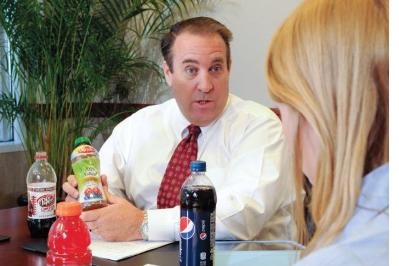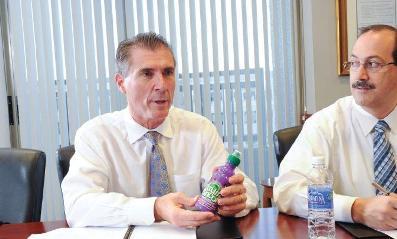Bottler of the Year Pepsi Bottling Ventures
“Our greatest competitive advantage is our people, the work ethic they possess, and their focus on winning,” says Paul Finney, president and chief executive officer of PBV.
Chris McCool, senior vice president of sales and marketing with PBV, echoes those same sentiments.
“We have tremendously dedicated employees that work for us, and a lot of them [are] long-tenured employees,” McCool says.
But as a jointly owned venture between Japan-based Suntory International and PepsiCo, Purchase, N.Y., PBV also recognizes how important its owners are to its continued success.
“We’re very fortunate, in our opinion, to have two very supportive owners,” Finney notes. “We have a board of directors that we meet with four times a year, and they’re very supportive in many different aspects, ranging from innovation [to] manufacturing.”
From the nearly $100 million the parent companies have invested in the last four years in manufacturing and distribution facilities to PepsiCo Americas Beverages Chief Executive Officer Al Carey’s re-energizing of the Pepsi system, PBV anticipates more great things to come, Finney says.
“We’re very excited about the future and are looking forward to growing our partnership with PepsiCo and our other suppliers,” he says.
Through those partnerships, he believes PBV will continue to grow in three major areas: product innovation, geographic expansion and being a low-cost provider through supply chain efficiencies.
“Those are the three things that we’re going to focus on to ensure that we continue to be at the forefront in the carbonated soft drink (CSD) system,” Finney notes.
These dedicated and aspirational qualities are what makes PBV Beverage Industry’s 2013 Bottler of the Year.
EXPANDING OPPORTUNITIES
With more than 700 SKUs throughout its eight-state territory, PBV works to support all of the products within its portfolio.
Within the PepsiCo portfolio, PBV carries major CSD brands including Pepsi and Mountain Dew as well as other brands in the PepsiCo family such as SoBe Lifewater, Aquafina, Lipton tea, O.N.E. Coconut Water and Gatorade for its small format stores such as the dollar, gas and convenience, independent business and drug store channels. PBV also carries the Starbucks Frappuccino brand, which is part of the North American Coffee Partnership, a joint venture between PepsiCo and Seattle-based Starbucks Coffee Co.
From the non-PepsiCo family, PBV manufactures and distributes major CSD brands for Plano, Texas-based Dr Pepper Snapple Group; Benicia, Calif.-based CytoSport’s Muscle Milk; Las Vegas-based Rockstar Inc.’s same-named energy drink; Salisbury, N.C.-based Carolina Beverage Corp.’s Cheerwine; and Austin, Texas-based Big Red Inc.’s same-named CSD varieties. In July 2012, PBV began selling Big Red and Big Blue take-home packages of 12-ounce cans and 2-liter bottles in its North Carolina markets. Among the retail outlets that carry the flavored soda varieties are Walmart, Kroger, Lowes Foods and Dollar General, the company says.
Also among PBV’s latest partnerships is one with Great Britain-based Britvic to carry its kid’s juice brand Fruit Shoot. PBV has rolled Fruit Shoot into all of its markets except for New York, which is on the company’s expansion list for the brand, McCool says.
Whether it’s the CSD category or some of the emerging segments, PBV has seen new product entries experience notable growth throughout its portfolio and has strong expectations going into 2013 for certain brands. From its CSD portfolio, the company introduced Pepsi Next, which is performing well, Finney notes. Frappuccino showed strong growth with double-digit increases, while Lipton had a strong performance in 2012 and is a company focus for 2013, McCool says.
“Our overall goal is to increase all of our non-[carbonated] businesses but not at the expense of our carbonated business,” he adds.
The company strives for healthy growth in both segments, and its fastest-growing segment overall is its premium, non-carbonated business at 7 percent year-to-date, Finney adds. McCool notes that the company will expand its portfolio to meet the needs of its customers and consumer trends such as health and wellness. Another aspect that PBV is taking into consideration is the growing Hispanic market.
“The Hispanic influence is growing throughout our market: We’re up to 9 percent in North Carolina, and they’re expecting to double that in the next five years, so we’re looking at expanding our portfolio to brands that can capture that growing consumer,” McCool explains.
However, accounting for this increasing SKU base also can present some challenges, so the SKU rationalization process is more important than ever, Finney says.
“We’re clearly doing more volume with all these SKUs, but we’re also making less margin overall on the products, so the balance we seek is to give that new product enough time to succeed but recognize when to pull the plug if it’s not succeeding,” he says.
PBV typically will give a product a year of exposure in the marketplace. After that time period, the company evaluates its performance to determine its future within the portfolio, Finney notes.
Although SKU proliferation can present some challenges for business operations, PBV has embraced this trend and has positioned itself for success.
“SKU proliferation is here to stay, and we have been and are in the process of designing our supply chain to maximize productivity in manufacturing, distribution and go-to-market despite the dramatic increases of SKUs,” says Matthew Bucherati, senior vice president of operations and supply chain with PBV.
Among those processes are the company’s 2009 acquisition of South Carolina bottler Conway-Myrtle Beach and its 2012 announcement that it will expand operations in its Winston-Salem facility.
The 2009 acquisition allowed the company to enter Marion and Horry counties, including Myrtle Beach, S.C., and allowed PBV to leverage its manufacturing in order to gain the most from the acquisition.
“We’re always looking for opportunities to expand,” Finney says. “It’s one of our key goals as we move forward and continue to grow both our base business as well as through expansion.”
Within its base business, PBV’s Winston-Salem expansion will feature an $82 million investment in facility up-fit, machinery and equipment in order to streamline operations and allow for vertical integration of production, the company says
UNDERSTANDING MARKETS

With such a broad portfolio base across its territories, PBV is tasked with the challenge to appeal to different demographics throughout its markets.
For example, CSDs remain No. 1 in all of its markets but have the strongest share in the Carolinas, while markets such as Vermont and New York are stronger within lemon-lime, ginger ale and seltzer varieties, McCool notes.
And given the fact that Pepsi-Cola was founded in New Bern, N.C., PBV is able to leverage that local tie within its marketing in North and South Carolina. “
Our current campaign, ‘Born in the Carolinas,’ is a program that’s doing very, very well for us, and it’s a program that Pepsi has supported that drives right down into the North Carolina market and is geared [toward] the North Carolina consumer,” Finney says. “That’s an example of some of the local marketing that we do that’s supported not only locally, but through PepsiCo.”
Being a producer and distributor of products for PepsiCo, PBV looks to the company for national marketing programs and initiatives but also will put its own spin on them.
“What we try to do is take their national playbook and regionalize it [to] make it more specific to our business, and I think ‘Born in the Carolinas’ is a great example of that,” McCool says. “We do think that PepsiCo reinvesting back into their core brand is a strategy that’s going to help us locally.”
That investment includes partnerships with TV programs as well as professional sports. “We’re seeing Pepsi on TV whether that be the ‘X-Factor,’ or our partnership with the NFL, much more today than four [to] five years ago, and we believe that that’s going to help us out quite a bit in terms of getting Pepsi back in a growth mode,” Finney says.
He adds that with the popularity of the NFL and the proximity of the Carolina Panthers in its home marketplace, PBV is able to leverage package programs as well as point-of-purchase programs to gain displays in stores and drive volume for its customers.
But strong national ties are not the only way PBV works with its customers. The bottler also partners with convenience retailer Pantry for the Wounded Warrior Project, a program that raises awareness and provides programs to meet the needs of injured service members. Pantry retailers, in conjunction with other partners including PBV, guarantee a certain dollar amount to Wounded Warriors, McCool explains.
